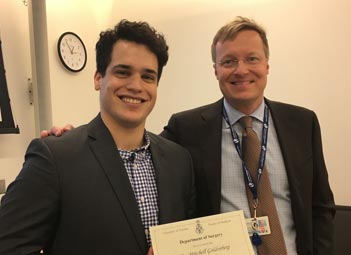Education Scholars Symposium
“Education is not the filling of a bucket, but the lighting
of a fire.”- William Butler Yeats
“Education Scholars Day was proposed by David Latter
as a parallel to Gallie Day in surgical science. The
inaugural Education Scholars Day, held in February,
brought together a core group of surgical educators in
the Department, including staff, fellows and residents.
Teodor Grantcharov gave the keynote address on his
extensive experience doing innovative research in surgical
education. Najma Ahmed analyzed the complex
issue of resident duty hours, where her research has
shown that limitations in work hours can negatively
affect the education of surgeons. She has recommended
flexibility – enabling residents to stay until noon after
call rather than leave unresolved problems at 8 AM. The
Department of Surgery at U of T has been granted the
ability to allow residents to work post-call until noon for
several years.”
On Friday, February 24th, the Inaugural Education
Scholars Symposium showcased a variety of innovative
efforts in scholarly research in education by our faculty
members and residents. The morning began with a keynote
presentation on Education, Innovation, and Quality
Improvement by Teodor Grantcharov (St. Michael’s).
He discussed the challenges of a “one-size-fits-all” simulation
model, the lack of sufficient evidence in establishing
assessment for selection tools, and the limited
understanding of factors influencing performance.
Markku Nousiainen (Sunnybrook) presented A Cost-
Analysis in Using Simulation for Teaching and Assessing
Orthopedic Surgery Residents emphasizing our need to
systematically document our simulation costs and outcomes
going forward, as a lack of evidence of effectiveness
could impede potential funding opportunities. Tulin
Cil (UHN) spoke about Mental Practice in Technical
Performance and its effectiveness in surgical performance,
especially in complex cases. Najma Ahmed (St.
Michael’s) presented Resident Duty Hours and suggested
that time-limited training negates technical skills competence
because the trainee may not acquire sufficient
hours of preparation. Nikki Woods (Wilson Center)
discussed the Integration of Basic & Clinical Sciences and
spoke to the importance of basic science training, as it
leads to the formation of a mental network of clinical
concepts that can later be readily applied to complex
cases. Sandra de Montbrun (St. Michael’s) concluded
with a presentation on Assessing Technical Competence for
Certification, a firsthand look at her development of the
COSATS. The implementation of this COSATS will
be the first time that a North American surgical society
has moved forward with a technical skills exam with the
purpose of re-certification, which could have potential
impact on patient care.
|

Mitchell Goldenberg with Markku Nousiainen
During his term as Chair of the Department of Surgery,
Dr. D.R Wilson began to formally recognize and reward
excellence in education scholarship in the Department
of Surgery. Greatly influenced by such efforts, Richard
Reznick went on to champion the Competency by
Design curriculum in Orthopedics. It was in this spirit
that the Inaugural Richard Reznick Excellence
Awards were given to Mitchell Goldenberg for his
poster presentation, Surgical Technical Performance
Impacts Patient Outcomes in Robotic-Assisted Radical
Prostatectomy, and to Brandon Girardi for his podium
presentation Surgical Boot Camp: The Transition from
Medical Student to Surgical Resident. Congratulations to
our other resident presenters Marissa Bonyun, Andras
Fesco, Naif Alotaibi, and fellow presenter Aenone
Harper.
I was delighted we could shine a light on the outstanding
education scholarship that is taking place
in the Department of Surgery. In my eyes, the first
Education Scholars Symposium was a resounding success.
I should like to sincerely thank Markku Nousiainen
and David Latter for organizing a spectacular display of
Departmental achievements.
Joanna Giddens, MBA, BAH;
Strategic Plan
Coordinator, Department of Surgery,
University of
Toronto
|